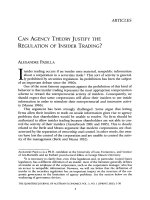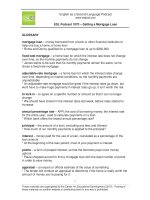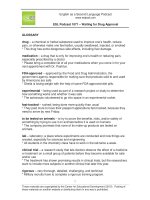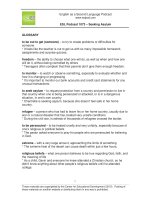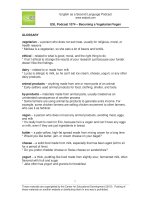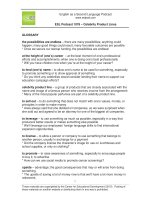ESL podcast 860 – insider trading
Bạn đang xem bản rút gọn của tài liệu. Xem và tải ngay bản đầy đủ của tài liệu tại đây (85.86 KB, 9 trang )
English as a Second Language Podcast
www.eslpod.com
ESL Podcast 860 – Insider Trading
GLOSSARY
hot tip – exciting secret information that will be beneficial; important information
that is not known to other people
* The store sends hot tips about upcoming sales to its best customers.
stock – share; partial ownership in a company, bought and sold as a way to try
to make money
* Their retirement funds are mostly invested in high-tech stock.
director – a member of a corporation’s board of directors; one of the people who
makes decision about the strategy and future plans of a company, working
closely with senior management
* Two of our directors have extensive experience in finance.
something big is brewing – a phrase meaning that something important is
happening, but the details of it and the final results are not yet known
* When people see all of the managers meeting behind closed doors like that,
they know something big is brewing.
publicly disclosed – information or data that is made available to the public, so
that anyone can access it and it is no longer secret
* Should the president’s medical records be publicly disclosed?
insider trading – financial transactions, particularly the buying and selling of
stock, by people who work for the company or are closely connected to it and
who are reacting to secret information that other people do not know
* Charlene never talks about her work with her friends, because she doesn’t want
to be accused of insider trading.
investor – someone who buys things and then tries to sell them later at a higher
price or produces products and services in order to make money
* Yokuhiro has begun buying homes as a real estate investor.
share – stock; individual units or pieces representing partial ownership of a
company, bought and sold as a way to try to take money
* How many shares of the company do you own?
shareholder – a person who owns one or more shares of a particular company;
a person who owns stock in a particular company
* The company has an annual meeting for all its shareholders to learn about the
company’s progress and vote on new directors.
1
These materials are copyrighted by the Center for Educational Development (2013). Posting of
these materials on another website or distributing them in any way is prohibited.
English as a Second Language Podcast
www.eslpod.com
ESL Podcast 860 – Insider Trading
corporate insider – a person who has information about a company, usually as
an employee of that company
* Business reporters are always trying to get information from corporate insiders
before a major company move.
to breach – to violate; to break the rules; to go beyond the limit of something
* The protestors breached the police line.
fiduciary – involving trust, especially for a person to be responsible for a
person’s or organizations’ money or investments
* The position has a fiduciary role, as it oversees all spending decisions.
SEC – the Securities and Exchange Commission; the U.S. governmental agency
responsible for regulating and overseeing the markets in which shares and stock
are bought and sold, making sure that transactions are fair
* How often does the SEC audit companies traded on the New York Stock
Exchange?
regulator – an agency that makes rules or laws controlling the behavior of others
* The Food and Drug Administration is a regulator of pharmaceutical companies,
controlling which new drugs can be sold.
shady – not completely honest, open, or transparent; with some hidden, negative
purpose; full of doubt
* When we asked our new neighbor where he works, he gave us a shady answer
and quickly changed the subject.
jumpsuit – a piece of clothing that covers one’s entire body, like a long-sleeved
shirt and a pair of pants that are connected, usually with a zipper or buttons
along the chest or back, often worn by people in prison
* All the mechanics here wear thick grey jumpsuits while they work on cars.
2
These materials are copyrighted by the Center for Educational Development (2013). Posting of
these materials on another website or distributing them in any way is prohibited.
English as a Second Language Podcast
www.eslpod.com
ESL Podcast 860 – Insider Trading
COMPREHENSION QUESTIONS
1. What does Rita mean when she says her brother “should know if something
big is brewing”?
a) He is responsible for new beers in the company.
b) He knows what important things are happening.
c) He is going to get a promotion soon.
2. What does Rick mean when he says, “I don’t think I’d look good in an orange
jumpsuit”?
a) He doesn’t want to be rich.
b) He doesn’t want to risk his investment.
c) He doesn’t want to go to jail.
______________
WHAT ELSE DOES IT MEAN?
tip
The phrase “hot tip,” in this podcast, means exciting and secret information that
will be beneficial, or important information that is not known to other people:
“Here’s a hot tip: If you click the gold star in the video game, you’ll get 500 bonus
points!” A “tip” is normally the pointed end of something: “During the
presentation, he used the tip of his pencil to point to the graphic as he explained
the chart.” Finally, the phrase “on the tip of (one’s) tongue” describes being
unable to produce a name or the word for something, because one has forgotten
it: “Sheila got really nervous during her Italian exam and felt like the words were
on the tip of her tongue, but she wasn’t able to say them.”
shady
In this podcast, the word “shady” means not completely honest, open, or
transparent, or with some hidden, negative purpose: “The company has
participated in a lot of shady business dealings, but technically, it hasn’t done
anything illegal.” The word “shady” also means protected from the heat and
bright light of the sun: “Why don’t we move these chairs to a shady area under
the trees, so we don’t get sunburned?” Or, “Which vegetables will grow in the
shady part of our garden?” The word “shade” refers to the specific type of color
or how light or dark a color is: “Her eyes are a beautiful shade of bright green.”
Finally, the related word “shades” is an informal term for sunglasses: “It’s going
to be bright on the beach, so remember to take your shades.”
3
These materials are copyrighted by the Center for Educational Development (2013). Posting of
these materials on another website or distributing them in any way is prohibited.
English as a Second Language Podcast
www.eslpod.com
ESL Podcast 860 – Insider Trading
CULTURE NOTE
Martha Stewart Insider Trading
In 2001, an “experimental drug” (a medicine that is being tested) produced by a
company called ImClone was not approved by the “Food and Drug
Administration” (FDA, the U.S. government agency responsible for keeping foods
and medicines safe). When that happened, but before the announcement was
“made public” (shared with all people), the company’s founder, Samuel Waksal,
shared the information with some family members and friends, telling them to sell
their ImClone stock before the announcement was made public. One of the
people he told was Martha Stewart, a “celebrity” (famous person) who is best
known for her “tips” (suggestions; ideas) for “housekeeping” (taking care of a
home and making it feel comfortable) and “entertaining” (having friends over for
visits).
After speaking with Samuel, Martha sold about $230,000 of ImClone stock one
day before the FDA made its announcement. The SEC began an investigation
and Martha “denied” (said she did not do) any “wrongdoing” (wrong or illegal
actions). But in 2004, she was “sentenced” (told what one’s punishment would
be) to five months in prison and five months of in-home “confinement” (not being
allowed to leave one’s home). Throughout the period and “to this day” (up to the
present time), Martha has “maintained her innocence” (continued to argue that
she is not guilty).
Some people had “speculated” (thought something to be true) that the “prison
term” (time spent in jail) would ruin Martha’s career, but she has since made a
“comeback” (a return to one’s previous status or level) and her businesses are
doing well.
______________
Comprehension Questions Correct Answers: 1 – b; 2 – c
4
These materials are copyrighted by the Center for Educational Development (2013). Posting of
these materials on another website or distributing them in any way is prohibited.
English as a Second Language Podcast
www.eslpod.com
ESL Podcast 860 – Insider Trading
COMPLETE TRANSCRIPT
Welcome to English as a Second Language Podcast number 860: Insider
Trading.
This is English as a Second Language Podcast episode 860. I’m your host, Dr.
Jeff McQuillan, coming to you from the Center for Educational Development in
beautiful Los Angeles, California.
Our website is ESLPod.com Go there and become a member of ESL Podcast.
That way, you can download the Learning Guide for this episode.
This episode is a dialog between Rita and Rick, about buying and selling stocks.
Let’s get started.
[start of dialog]
Rita: I just got a hot tip from my brother to buy stock in McQ Corp.
Rick: Your brother works for McQ Corp., doesn’t he?
Rita: Yeah, he’s a director in the company, so he should know if something big is
brewing.
Rick: If he’s a director and he knows something that isn’t publicly disclosed
about the company, and he’s telling you to buy stock, isn’t that insider trading?
Rita: Insider trading?! I’m not a major investor. I don’t plan to buy so many
shares that I’ll become a major shareholder. All I can afford are a few shares.
Rick: Still, he’d be considered a corporate insider and may be breaching his
fiduciary responsibilities. Giving you this tip could get him, and you, into a lot of
trouble.
Rita: Who are you, an SEC regulator? People do this kind of thing all the time,
and there’s nothing shady about it. If you’re smart, you’d buy a few shares
yourself.
Rick: Uh, no thanks. I don’t think I’d look good in an orange jumpsuit.
[end of dialog]
5
These materials are copyrighted by the Center for Educational Development (2013). Posting of
these materials on another website or distributing them in any way is prohibited.
English as a Second Language Podcast
www.eslpod.com
ESL Podcast 860 – Insider Trading
Rita begins by saying to Rick, “I just got a hot tip from my brother to buy stock in
McQ Corp.” A “tip” (tip) is advice, information that will help you. A “hot tip” is
typically a tip about some piece of information that’s very timely that you need to
do something about right away. This is often a term that we use when we’re
talking about secret information – in this case, the information is about buying
stock. “Stock” (stock) is partial ownership in a company. You can buy stock in
what’s called a “stock market.” You could buy stock in a big company like
Microsoft or Apple or any other of the large companies. They all sell stock and
you can go and buy a little piece of that company.
Rita then has a hot tip about buying stock in McQ Corp. Rick sys, “Your brother
works for McQ Corp. doesn’t he?” Rita says, “Yeah. He’s a director in the
company.” A “director” is a member of the company’s, the corporation’s “board of
directors.” This is a group of people – men and women – who make important
decisions about the company, all the most important decisions, including who to
hire as the president. They are made by the Board of Directors. Rita’s brother is
on the Board of Directors of McQ Corp.
Rita says, “He should know if something big is brewing.” The expression
“something big is brewing” (brewing) means that something important is going to
happen but no one knows exactly what it is. It’s secret information. “Something
big is brewing.” Rick says, “If he’s a director and he knows something that isn’t
publicly disclosed about the company, and he he’s telling you to buy stock, isn’t
that insider trading?” Rick is saying that if Rita’s brother is on the board of
directors of McQ Corp. and he knows something that isn’t publicly disclosed, then
there’s a problem. “Publicly” means that everyone knows about it. “Disclosed”
means that you tell someone. So, if you “publicly disclose (disclose) information,”
you announce it to everyone. You tell the newspaper, you tell the television
stations, “This is what’s happening in my company.”
In the United States, there are very strict, very specific rules that you have to
follow as a company. You can’t be buying and selling your stock based on
information that you don’t tell everyone else about. That’s exactly what is
happening here. Rita’s brother is using his information that hasn’t been publicly
disclosed to tell his sister to buy stock. That is what we call “insider trading.”
“Trading” refers to buying and selling stocks. “Insider” (insider) refers to someone
who is inside of or part of an organization or group, in this case, a corporation, a
company. “Insider trading” is when you take the information you have about your
company and you buy and sell stocks, even though no one else knows that
information. That is against the law in the United States if the company is what is
called “publicly traded;” that is, if anyone can go and buy stock in that company.
6
These materials are copyrighted by the Center for Educational Development (2013). Posting of
these materials on another website or distributing them in any way is prohibited.
English as a Second Language Podcast
www.eslpod.com
ESL Podcast 860 – Insider Trading
Rita says “Insider trading? I’m not a major investor.” An “investor” (investor) is
someone who “invests” (invest). “To invest” means to buy stock in a company or
to buy something that you think will be worth more money in the future. You can
be a real estate investor. You could buy buildings and houses, hoping that the
price goes up. By the way, that doesn’t always happen.
Rita says she’s not a “major investor.” “Major” (major) here means a very
important one or a large investor. She says, “I don’t plan to buy so many shares
that I’ll become a major shareholder.” “Shares” are what we call the individual
units of stock. A “shareholder” is someone who owns shares. So, “shareholder”
here really means the same as “stockholder” – someone who owns shares, who
owns stock in a specific company. Rita says, “All I can afford” – all I have money
for – “are a few shares” – just a couple pieces of stock, if you will. Rick says,
“Still, he’d be considered a corporate insider” – he, being Rita’s brother – “and
may be breaching his fiduciary responsibilities.”
We already talked about what an “insider” is. “Corporate” (corporate) is
something related to a corporation – a large company, in this case. So, a
“corporate insider” would simply be someone who works at a large company or a
corporation. Rick says that Rita’s brother would be considered a corporate
insider and may be – possibly – breaching his fiduciary responsibilities. “To
breach” (breach) means to break or violate or to do something wrong with
regards to, in this case, responsibilities that you have. If you’re on the board of
directors of a publicly traded corporation, you have fiduciary responsibilities.
“Fiduciary” (fiduciary) involves the trust that the company has given to you, as it
relates to money or investments. So, “fiduciary” is usually a term we use when
we’re talking about money and your responsibilities as someone who has
information about a company or about an individual.
Rick says, “Giving you this tip could get him” – Rita’s brother – “and you, into a
lot of trouble.” You could possibly be breaking the law here. Rita says, “Who are
you, an SEC regulator?” “SEC” stands for the Securities and Exchange
Commission. This is the U.S. government agency that is responsible for
regulating, for making sure that people in the stock market are doing what they
are supposed to, are following the law. A “regulator” (regulator) is a person who
works in a government agency, a government organization that is responsible for
going out and making sure people are following the rules. In this case, the rule is
related to buying and selling stocks.
Rita says, “People do this kind of thing all the time and there’s nothing shady
about it.” “Shady” (shady) means dishonest, not completely honest. There’s
something that you’re hiding. There’s something that you aren’t supposed to do
that you are doing. That’s the adjective “shady.” We might say, “He’s a shady
7
These materials are copyrighted by the Center for Educational Development (2013). Posting of
these materials on another website or distributing them in any way is prohibited.
English as a Second Language Podcast
www.eslpod.com
ESL Podcast 860 – Insider Trading
character,” meaning he’s not an honest person. He’s not someone you should
trust. There’s something strange about that person. That’s what people say about
me. Rita says, “If you’re smart, you’d buy a few shares yourself.” So, Rita says
there’s nothing wrong with this.
Rick says, “No thanks, I don’t think I’d look good in an orange jumpsuit.” A
“jumpsuit” (jumpsuit) is a piece of clothing that covers your entire body, from your
shoes up to your neck, from your ankles to your neck. You would, perhaps, see
someone who works on automobiles – a mechanic – might be wearing a jumpsuit
to protect his clothing underneath. However, we also put prisoners – people who
are in jail, people who have been arrested because they’ve broken the law – in
jumpsuits. And it’s become common in recent years to put them in a very brightcolored jumpsuit so in case they escape, they are easy to catch. And the color
that is often used is orange. So, when Rick refers to an orange jumpsuit, he’s
talking about someone who would be arrested. He thinks that what Rita is
recommending is against the law and he doesn’t want to go to jail.
Now let’s listen to the dialog this time at a normal speed.
[start of dialog]
Rita: I just got a hot tip from my brother to buy stock in McQ Corp.
Rick: Your brother works for McQ Corp., doesn’t he?
Rita: Yeah, he’s a director in the company, so he should know if something big is
brewing.
Rick: If he’s a director and he knows something that isn’t publicly disclosed
about the company, and he’s telling you to buy stock, isn’t that insider trading?
Rita: Insider trading?! I’m not a major investor. I don’t plan to buy so many
shares that I’ll become a major shareholder. All I can afford are a few shares.
Rick: Still, he’d be considered a corporate insider and may be breaching his
fiduciary responsibilities. Giving you this tip could get him, and you, into a lot of
trouble.
Rita: Who are you, an SEC regulator? People do this kind of thing all the time,
and there’s nothing shady about it. If you’re smart, you’d buy a few shares
yourself.
8
These materials are copyrighted by the Center for Educational Development (2013). Posting of
these materials on another website or distributing them in any way is prohibited.
English as a Second Language Podcast
www.eslpod.com
ESL Podcast 860 – Insider Trading
Rick: Uh, no thanks. I don’t think I’d look good in an orange jumpsuit.
[end of dialog]
There’s nothing shady about our scriptwriter, I don’t think. That’s the wonderful
Dr. Lucy Tse I’m talking about here. Thank you, Lucy.
From Los Angeles, California, I’m Jeff McQuillan. Thank you for listening. Come
back and listen to us again, right here on ESL Podcast.
English as a Second Language Podcast is written and produced by Dr. Lucy Tse,
hosted by Dr. Jeff McQuillan. Copyright 2013 by the Center for Educational
Development.
9
These materials are copyrighted by the Center for Educational Development (2013). Posting of
these materials on another website or distributing them in any way is prohibited.

